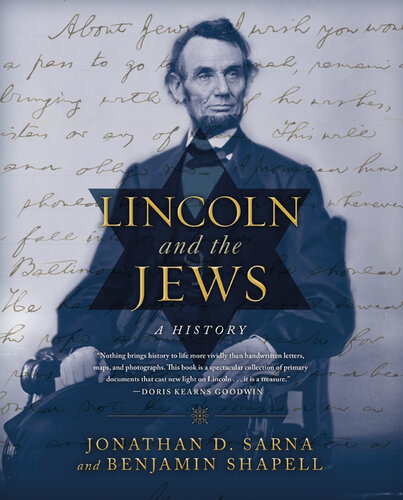
Lincoln and the Jews
A History
کتاب های مرتبط
- اطلاعات
- نقد و بررسی
- دیدگاه کاربران
نقد و بررسی

Starred review from January 12, 2015
Even Lincoln experts are likely to learn something from this fascinating and comprehensive study of the president’s relationship with American Jews, which is being published to coincide with a travelling exhibition of original documents. Sarna, a preeminent historian of American Jewry, and Shapell, the founder of the Shapell Manuscript Foundation, make good use of what Shapell calls “the ‘other’ letters of U.S. presidents”—ones that don’t present significant historical facts, but that limn the quotidian aspects of Lincoln’s life, such as his recommendation of his Jewish chiropodist, Issachar Zacharie. The authors convincingly make the case that Lincoln’s positive attitude toward Jews was strongly influenced by Abraham Jonas—a fellow Illinois politician, the only man Lincoln ever directly called “one of my most valued friends,” and one of the first to suggest that he seek the Republican nomination for President in 1860. Jonas also warned his friend of a plot to assassinate him before his first inauguration. Images of the source material add depth and lend perspective; a page from a narrative describing Lincoln’s death is stained with blood, probably the president’s.

December 15, 2014
A noted historian asks new questions about Abraham Lincoln. When Sarna (American Jewish History/Brandeis Univ.; When General Grant Expelled the Jews, 2012, etc.) noticed, to his surprise, that there was a Lincoln Street in Jerusalem, he became curious about the American president's connection to Jews. Drawing on archival sources and historical accounts, the author paints a well-delineated portrait of Lincoln as a friend and advocate of Jews before and during his political career. Heavily illustrated with images and manuscripts from the Library of Congress, many other collections and especially from the Shapell Manuscript Foundation, the book offers an enhanced perspective on Lincoln's moral and ethical decisions, as well as his personal friendships. Jewish immigration burgeoned during Lincoln's lifetime. A population of about 3,000 in 1809 grew to more than 150,000 Jews in 1865, the year Lincoln was assassinated. Along with this increase came a rise in anti-Semitism, testing Lincoln's beliefs about equality and justice. Growing up, he learned about Jews from the Bible or local gossip. His first interactions occurred in Illinois, where he met Abraham Jonas, a British immigrant, who became a lawyer, state legislator and active member of the Whig party; like Lincoln, Jonas later became a Republican. Jonas served as committee chairman for the Lincoln-Douglas debate, shared Lincoln's views on slavery and, writes Sarna, "was a particularly shaping influence. Jonas served for him as an enduring model of what it meant to be a Jew...." When Jewish soldiers-more than 7,000 served in the Union Army-petitioned for a rabbi as chaplain, Lincoln complied; in 1862, a Passover Seder was held on a battlefield in West Virginia. Many Civil War generals were blatantly anti-Semitic but none so powerfully as Ulysses Grant, who issued General Order No. 11, expelling Jews from the area under his command, an order Lincoln immediately countermanded. Sarna and manuscript collector Shapell offer a vivid, fresh perspective on Lincoln's life and times.
COPYRIGHT(2014) Kirkus Reviews, ALL RIGHTS RESERVED.

























دیدگاه کاربران